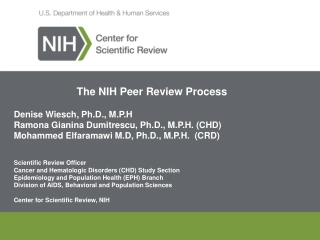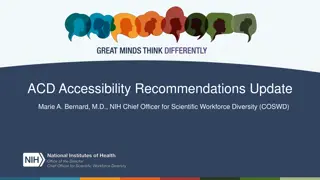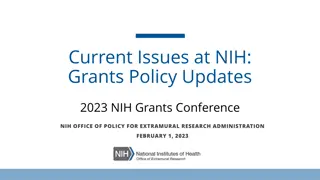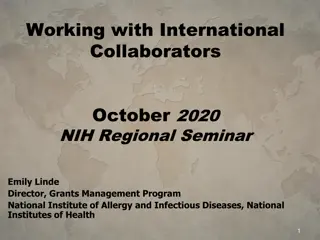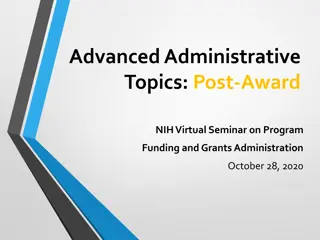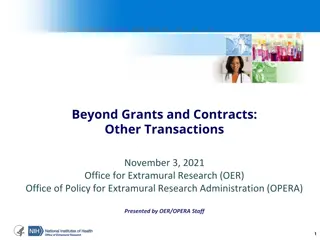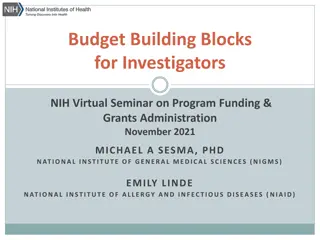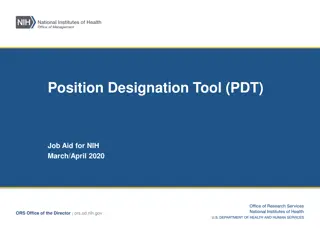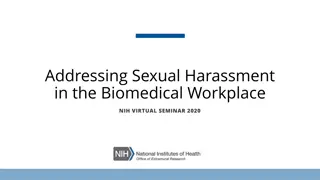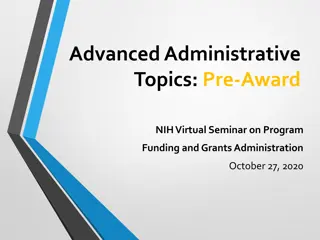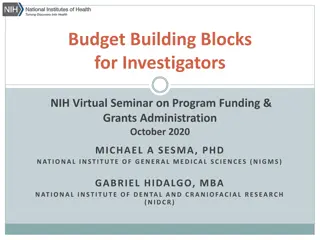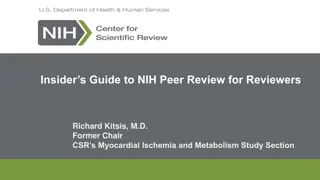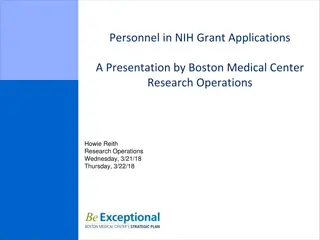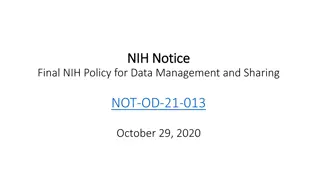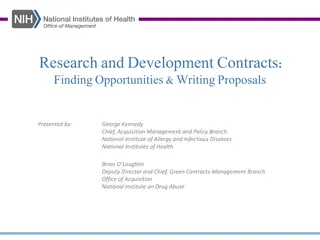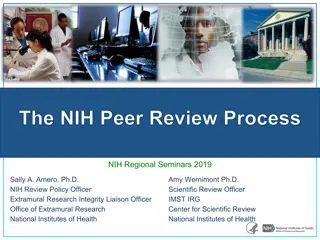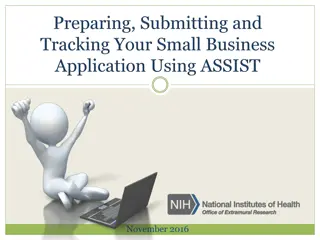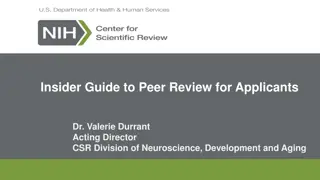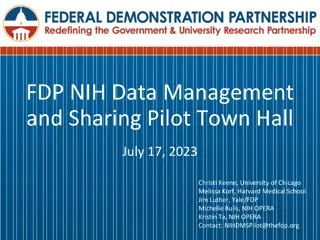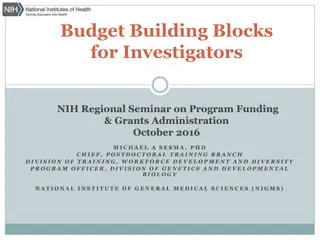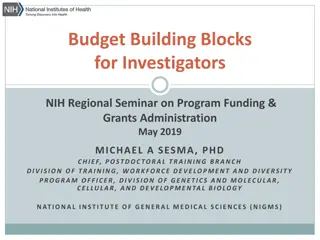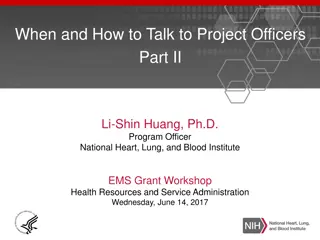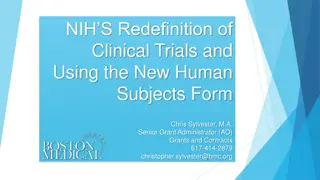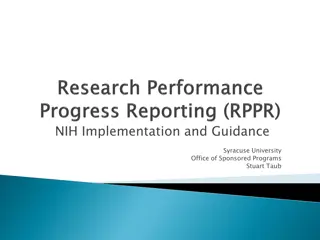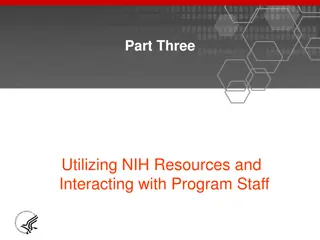The NIH Peer Review Process
The NIH Peer Review Process, including the role of the Center for Scientific Review (CSR) in receiving, referring, and reviewing grant applications. Understand how applications are assigned to institutes or centers and the importance of scientific and technical merit in the review process.
1 views • 18 slides
Understanding the NIH Research Enhancement Award (R15) Program
Explore the NIH Research Enhancement Award (R15) Program, its goals, differences from the R01 grant, eligibility criteria, and strategies for success. Learn about the impact of R15 grants, active awards landscape, and how it supports small-scale research projects and enhances the research environmen
0 views • 37 slides
NIH Data Management and Sharing Policy Overview
This content provides a detailed overview of the NIH Data Management and Sharing Policy, focusing on the importance of sharing scientific data, the scope of the policy, reasons for data sharing, application of the policy, and differences between Data Management Plans and Resource Sharing Plans. It a
2 views • 25 slides
NIH Grants Policy Updates Presentation January 31, 2024
The NIH Grants Policy Updates presentation covered budget updates, policy reminders, resources, and Q&A sessions. It discussed the recent budget legislation signed by President Biden, updated policy guidance for subaward/consortium agreements, and changes in the Small Business Innovation Research pr
1 views • 36 slides
Update on ACD Accessibility Recommendations by NIH Chief Officer
The ACD Accessibility Recommendations Update, led by NIH Chief Officer Dr. Marie A. Bernard, focuses on supporting the inclusion of people with disabilities in the scientific workforce. The working group, chaired by Drs. Bonnielin Swenor, Lisa Iezzoni, and Steven Barnett, aims to provide detailed su
6 views • 10 slides
March 2024 Monthly Research Administration Meeting Highlights
Federal updates and important highlights from the Monthly Research Administration Meeting (MRAM) held in March 2024, including key information on NIH Grants Policy Statement updates, international subawards requirements, implementation of common forms by NIH, and SBIR/STTR Disclosure Requirement. St
3 views • 41 slides
Biological Registration Process and Administrative Controls for Safety Focus
Registering work involving biological materials, toxins, and recombinant DNA is essential for safety compliance. Principal Investigators must follow NIH guidelines and register with the Institutional Biosafety Committee. Contact NIH for additional instructions on working with toxins and Select Agent
4 views • 13 slides
Updates on Biosketch Format Changes by NIH - June 2021
Changes to the Biosketch format by NIH were released through NOT-OD-21-073 in March 2021. The updates include modifications to the Personal Statement, Positions, Scientific Appointments, and Honors sections, as well as the elimination of the Research Support section in non-fellowship Biosketches. Th
0 views • 39 slides
Roles and Responsibilities in the NIH Grants Life Cycle
Explore the key players involved in the grants life cycle at NIH, including scientific review officers, program officers, and grants management specialists. Learn when and how to seek help or advice from the NIH throughout the different stages of the process, from application submission to post-revi
0 views • 20 slides
Updates on NIH Grants Policy and Fiscal Changes for 2023
Stay informed about the latest NIH grants policy updates for 2023, including fiscal changes, salary cap adjustments, and revised requirements for biographical sketches. It's essential to adhere to the updated formats to avoid delays in funding consideration. Additionally, be aware of the new notific
0 views • 38 slides
Working with International Collaborators: NIH Regional Seminar Overview
Explore key considerations when collaborating with foreign institutions for research projects funded by the National Institutes of Health (NIH). Learn about the significance of international research, NIH's investment strategies, the definition of a foreign component, and application eligibility cri
0 views • 43 slides
Insights into Post-Award Challenges in NIH Grants Administration
Explore the complexities and issues in post-award management of NIH grants through case studies and real-life examples. Key aspects discussed include changes in recipient organizations, research team delays, large balances, and unexpected changes post-award. Gain perspectives on federal policies, ta
0 views • 41 slides
Guide to NIH K-Awards: Application, Types, and Opportunities
A comprehensive overview of NIH K-Awards, including what they entail, the various types available (such as K01, K07, K22), and the opportunities they offer for researchers at different career stages. Learn about mentorship, research strategies, and institutional commitments crucial for a successful
1 views • 40 slides
Exploring NIH Other Transactions: A Comprehensive Overview
Join the Office for Extramural Research (OER) and the Office of Policy for Extramural Research Administration (OPERA) in a detailed session on NIH Other Transactions (OTs). Learn about the authority, characteristics, implementation, and contacts related to OTs, a unique type of legal instrument beyo
0 views • 23 slides
NIH Budget Basics for Researchers in Virtual Seminar
The National Institutes of Health (NIH) provides essential information in a virtual seminar on program funding, grants administration, and budget building blocks for investigators. Key topics covered include budget types, components, important considerations, award policy issues, and tips for gettin
0 views • 40 slides
Position Designation Tool (PDT) Job Aid for NIH - March/April 2020
The Position Designation Tool (PDT) is vital for determining background investigations accurately, maintained by the Defense Counterintelligence & Security Agency (DCSA). This tool identifies national security or public trust responsibilities for positions. Proper designation is crucial for federal
1 views • 27 slides
Addressing Sexual Harassment in the Biomedical Workplace: NIH Seminar Overview
Explore how the NIH handles allegations of sexual harassment in the biomedical workplace through policies, procedures, and support for a safe work environment. Learn about panelists and NIH guidelines for addressing and reporting incidents. Find out the impact on research awards and the process for
2 views • 9 slides
Understanding Challenges in Pre-Award Administration at NIH
Explore the complexities of pre-award issues in NIH grants administration, including factors such as human subjects research, multiple collaborating institutions, and policy changes. Gain insights on thinking like a federal agency and navigating the diverse funding institutes to make informed decisi
0 views • 40 slides
NIH Budget Basics and Tips for Grant Applications
Explore the essential components of preparing a budget for NIH grants, including types of budgets, cost principles, and tips for getting started. Learn about allowable costs, FOAs, funding limits, and common pitfalls to avoid when applying for NIH grants.
0 views • 40 slides
Understanding NIH Funding Opportunities and Processes
This session introduces attendees to NIH funding opportunities, providing insights on working effectively with NIH to secure grants for health-related research. Learn about the mission of NIH, types of grants available, NIH Institutes & Centers, and grant review criteria. Gain valuable information t
0 views • 13 slides
Insider's Guide to NIH Peer Review for Reviewers by Richard Kitsis, M.D.
This insider's guide provides valuable insights for reviewers participating in NIH grant application peer reviews. It covers essential aspects such as staying grounded, getting started, writing reviews effectively, scoring applications, participating in meetings, and enjoying the overall experience.
0 views • 12 slides
Understanding NIH Personnel Roles in Grant Applications
NIH provides guidance on defining personnel roles in grant applications, emphasizing the importance of key personnel designations and ERA Commons IDs. The presentation clarifies requirements for different roles, particularly for PD/PIs and postdoctoral positions, highlighting the necessity of follow
0 views • 36 slides
Final NIH Policy for Data Management and Sharing
This document outlines the final NIH Policy for Data Management and Sharing, emphasizing the importance of scientific data quality, validation, and replication. It clarifies that scientific data should be of sufficient quality to validate and replicate research findings, irrespective of publication
4 views • 19 slides
NIH Exit Survey Reporting Tools Overview
The NIH Exit Survey provides valuable insights into exiting employees' opinions to aid succession planning and organizational improvements. Managed by the WSDD, the survey is anonymous and accessible to all full-time NIH employees leaving the organization, transferring ICs, or with expiring appointm
0 views • 10 slides
Enhancing Human Subjects Research Through NIH Policy Changes
The National Institutes of Health (NIH) is implementing reforms and initiatives to improve the stewardship of research involving human subjects, particularly in the context of clinical trials. These changes include new forms for data collection, training in Good Clinical Practice, use of a single In
0 views • 13 slides
Understanding NIH Research and Development Contracts
Explore the world of Research and Development Contracts at the National Institutes of Health (NIH) with insights on opportunities, proposals, types of contracts, contracting offices, examples, and regulatory frameworks. From finding opportunities to pursuing contracts, this comprehensive guide cover
0 views • 29 slides
Understanding the NIH Peer Review Process: Insights from NIH Experts
Delve into the intricate NIH peer review process with insights from Dr. Sally A. Amero and Dr. Amy Wernimont. Explore the two-stage review process, scope of initial peer review, key decisions by the Division of Receipt and Referral, and the diverse institutes under the National Institutes of Health.
0 views • 42 slides
Understanding NIH's ASSIST System for Grant Application Submission
Find out how to utilize the NIH ASSIST system for preparing, submitting, and tracking grant applications to NIH through Grants.gov. Learn about the registration process, submission options, and valuable resources available to assist you. ASSIST streamlines the application process by ensuring complia
0 views • 74 slides
Insider Guide to NIH Peer Review Process for Applicants
Learn valuable insights and expert tips on navigating the NIH peer review process from the Acting Director of CSR Division of Neuroscience, Development, and Aging. Discover key factors for a successful application, including understanding review criteria, developing your research idea, and effective
0 views • 14 slides
FDP NIH Data Management and Sharing Pilot Town Hall Overview
The FDP NIH Data Management and Sharing Pilot Town Hall provides updates on the pilot phases, including testing DMS plan templates and establishing common cost policies. The collaboration aims to generate consistency in DMS plan requirements across NIH ICs, reducing administrative burden for researc
0 views • 13 slides
Support and Resources for NEAGEP Students by NIH IMSD
Explore the wide array of resources offered by NIH IMSD to support NEAGEP students in their academic and research endeavors. From writing retreat fellowships to skill development workshops, grant writing programs, and specialized training courses at NIH, these initiatives aim to empower students in
0 views • 20 slides
Deciphering NIH Grant Types: A Practical Guide for Researchers
Navigate the complex world of NIH grant types and acronyms with this informative guide. Learn about key terms, study sections, and grant options to enhance your research funding opportunities. Discover the nuances of R01, R21, and other grant types to maximize your chances of success in securing NIH
0 views • 9 slides
Morality in UK Drug Policy: Policy Constellations Analysis
Morality plays a significant role in shaping drug policy in the UK, as revealed by the research conducted by Professor Alex Stevens at the University of Kent. The study investigates the moral commitments underlying different policy positions in UK drug policy debates, highlighting five ethico-politi
0 views • 19 slides
NIH Funding and Grants Administration - Tips and Guidelines
Explore essential tips and guidelines for applying to the National Institutes of Health (NIH) for funding and grants. Learn about budget basics, preparing budgets, award policy issues, and key considerations for successful grant applications. Understand who the grant is awarded to and the responsibl
0 views • 52 slides
NIH Budget Building Blocks for Investigators
Explore the budget basics and get started with NIH funding. Understand the types of budgets, components, award policy issues, and NIH cost principles. Learn tips for preparing applications, including important considerations and pitfalls to avoid when submitting proposals to the NIH.
0 views • 56 slides
Understanding Policy Formulation: Key Concepts and Approaches
Policy formulation is a crucial step in the policy-making process, involving identifying and crafting policy alternatives to address various issues. This phase requires participants to define policy problems, develop alternatives, and select the most feasible solutions based on criteria such as feas
0 views • 12 slides
Navigating NIH Funding: Insights for Researchers
Gain valuable insights on interacting with NIH Program Officers, understanding grant mechanisms, identifying funding opportunities, and utilizing NIH Reporter for research. Learn about career stages, IC-specific missions, and using online resources effectively in your grant-seeking journey.
0 views • 22 slides
Understanding NIH's Redefinition of Clinical Trials
NIH redefines clinical trials as research studies where human subjects are prospectively assigned to interventions to evaluate their effects on health-related outcomes. The criteria for defining a clinical trial by NIH include human participant involvement, prospective intervention assignment, evalu
0 views • 7 slides
Streamlining Research Progress Reporting for NIH Awards
Research Performance Progress Report (RPPR) is a standardized mechanism to facilitate interim progress reporting for NIH-funded projects, aiming to enhance consistency and minimize administrative burdens. It replaces the eSNAP process for certain types of awards and fellowship grants. RPPR includes
0 views • 12 slides
Understanding NIH Resources and Engaging with Program Officials
Learn about the role of Program Officials at NIH, their responsibilities, and how to contact the right official for your research needs. Discover where to find Program Officials and why it is essential to engage with them in navigating the NIH grant process effectively.
0 views • 21 slides
